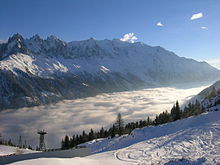A sea of clouds is an overcast layer of stratocumulus clouds, as viewed from above, with a relatively uniform top which shows undulations of very different lengths resembling waves on the sea.[1] A sea of fog is formed from stratus clouds or fog and does not show undulations.[2]
| Sea of clouds | |
|---|---|
 Sea of clouds in Chamonix-Mont-Blanc. | |
| Classification | Family C (Low-level) |
| Appearance | Uniform with ondulations |
| Precipitation | no |

In both cases, the phenomenon looks very similar to the open ocean. The comparison is even more complete if some mountain peaks rise above the clouds, thus resembling islands.
Formation edit
A sea of clouds forms generally in valleys or over seas in very stable air mass conditions such as in a temperature inversion. Humidity can then reach saturation and condensation leads to a very uniform stratocumulus cloud, stratus cloud or fog. Above this layer, the air must be dry. This is a common situation in a high-pressure area with cooling at the surface by radiative cooling at night in summer, or advection of cold air in winter or in a marine layer.
Artistic uses edit
- The term Sea of Clouds (雲海) is a Chinese poetic term for the surroundings of a mountain's summit, such as the one at Huangshan.[3]
- Wanderer above the Sea of Fog is an oil painting composed in 1818 by the German Romantic artist Caspar David Friedrich depicting this phenomenon.
References edit
- ^ World Meteorological Organization. "Sea of clouds". Eumetcal. Archived from the original on March 3, 2016. Retrieved February 22, 2015.
- ^ World Meteorological Organization. "Sea of fog". Eumetcal. Archived from the original on March 3, 2016. Retrieved February 22, 2015.
- ^ Maitland, Derek; Taylor, Chris (1998). Traveler's China companion. Old Saybrook: Globe Pequot Press. p. 20. ISBN 9780762702497.